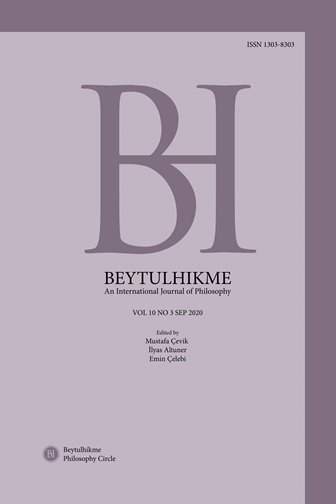Aristoteles Mantığını Aşma ve Yeniden İnşa Etme Gerilimi: 17. ve 18. Yüzyıl Osmanlı-Türk Mantık Tarihine Genel Bir Bakış
Author :
Abstract
Osmanlı düşünce tarihi çalışmaları pek yakın zamanlara kadar on beş ve on altıncı yüzyılları “verimli dönemler” olarak değerlendirirken on yedinci yüzyıl ve sonraki dönemleri “çöküş ve gerileme çağı” olarak tasvir etme eğiliminde olmuştur. Bu anlatının düşünce tarihçiliğinden ziyade siyasi tarihçiliğin etkisinde olduğu kolayca anlaşılabilir. Bu tutumun, henüz başlangıç aşamasında olsa da değişmişmeye başladığı ve söz konusu asırlardaki Osmanlı ulemasının bilgi üretme ve işleme biçiminin şimdilerde psikolojik tavır alışların ötesinde daha rasyonel bir tavırla incelendiği söylenebilir. Bu yazı on yedi ve on sekizinci yüzyıl Osmanlı-Türk mantıkçılarının çeşitli konulardaki görüşlerini dikkate alarak bahse konu olan dönemin mantık tarihine dair genel bir değerlendirme sunmaktadır. Ana akım mantık çalışmalarının İbn Sînâcı-Aristotelesçiliğin sınırlarını aşarak kendi içinde bir yenilenme tutumu geliştirdiği gözlemlenirken, bazı mantıkçıların da -yerleşik bir gelenek oluşturamamış olsa bile- yenilenme saikiyle Aristoteles’e geri dönüş tepkisi gösterdiği anlaşılmaktadır. Bu yazının amacı dönemin bu iki nitelik üzerinden okunabileceğine dair henüz kesinleşmemiş bir öneri sunmaktır.
Keywords
Abstract
Until recently, the studies on the Ottoman intellectual history showed a tendency to describe the seventeenth century and later periods as the “age of collapse and decline” while describing the fifteenth and sixteenth centuries as “productive periods”. It can be easily understood that this narrative is influenced by political historiography rather than intellectual historiography. Nowadays, this attitude has changed and the way of producing and processing knowledge of Ottoman scholars in these centuries has begun to be handled more rationally. This article not only examines the views of Ottoman-Turkish logicians on various subjects in the seventeenth and eighteenth centuries but also provides a general evaluation of the history of logic in these ages. It is observed that the mainstream logic studies exceeded the borders of Avicennian- Aristotelianism and developed a renewal attitude in itself. On the other hand, it is understood that some works have also brought a proposal to back to Aristotle as the idea of renewal, even if it could not establish a settled tradition. This article aims to present an imprecise proposal that the period can be read through these two qualities.





